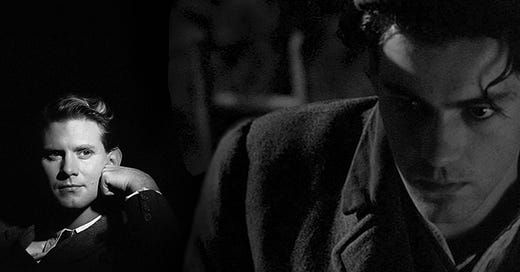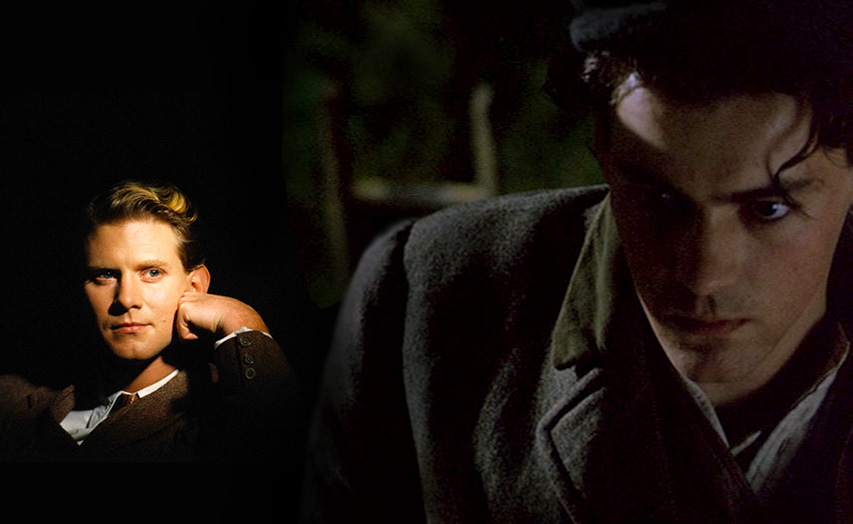The Myth-Making of E.M. Forster's Maurice
With his posthumously published novel, Forster forged a wild-at-heart possibility of romance and permanence for gay men.
“I was determined that two men should fall in love and remain in it for the ever and ever that fiction allows...” —E.M. Forster
I FIRST SAW MERCHANT AND IVORY’S film adaptation of E. M. Forster's novel Maurice thirty-five years ago. I can't remember if the film was a success or not—praised or panned. But I do recall going back to the theater to see it a second time two days after my initial viewing. I had to experience the film’s final ten minutes again—just to make sure that my overamped imagination hadn’t tricked me.
And no, I'd embellished nothing. The closing tableau was still in place, crowned by the swoon-inducing kiss between actors James Wilby and Rupert Graves. A screen kiss that released a spontaneous response from the audience (mostly queer men and their dates). A release that was a hybrid of a sigh and an exclamation.
There is something optical illusion-like in the way that Wilby defies gravity by simultaneously falling on top of and sweeping Graves upwards into his arms in front of the boathouse fireplace. An embrace both glamorous (in the old Hollywood tradition) and rapacious. A powerful merger that only two men colliding with one another could generate. Who’d ever seen something like that depicted within the tribunal of our culture’s darkened, image-weaving meeting space (the community movie theater)? In the 80s, amidst the roiling health crisis of AIDS, gay men certainly had not.
And better than the two men’s embrace was the even more visceral, fantastic close-up of Rupert Graves' dazed, love-besotted expression—after the kiss—with the corner of his impish mouth still shimmering with saliva. Actually, I think that was the image that caused the audience to let out that loud involuntary response in the theater. We’d been waiting decade after decade to see a reverie like Maurice depicted on the big screen.
Talking with gay friends after exiting the theater, we all agreed that something fantastical had occurred, something that pierced our hearts and confirmed a feeling that we’d each labored with during our childhood as budding homos. That screen kiss soothed a sore area of doubt and apprehension and was a thousand times more effective than any gay pride march or civil rights amendment. It fostered in us a powerful, unshakable hope.
Maurice, the novel, wasn't published until 1971, shortly after Forster’s death. The manuscript was found in his rooms at Cambridge in 1970. “Publishable,” a note attached to the manuscript in his own hand read, “but worth it?” Merchant and Ivory made the film in 1987—a bold stroke, arriving as it did, right on the heels of their career-making A Room With A View. And it was very much worth it.
The film version remains mostly true to Forster's narrative and goes something like this: Maurice Hall (James Wilby) is fatherless and lives with his mother and two sisters. While attending Cambridge, he develops a secret, romantic, sexless, platonic relationship with the aristocratic Clive Durham (Hugh Grant), a relationship that continues after Maurice is expelled and goes to live at Pinge, Clive’s estate. Clive grapples with his queerness, and takes a trip alone to Greece—an aridly intellectual, anachronistic move that has an opposite impact on his future. Once home, Clive renounces his relationship with Maurice and begins the hunt for a female that can shore up his political ambitions.
By what appears to be retribution on Forster's part, Clive ends up in a farce of marriage but is nowhere nearer to squelching his queer longing. Maurice, on the other hand—lonely, horny, and frustrated—seeks a homo “cure” in hypnosis and then begins an affair with Clive’s gamekeeper, Alec Scudder (Rupert Graves). So we have boy meets (but never really has) boy, and boy loses boy, and then boy meets the first boy’s “boy,” and boy, oh boy, does boy wind up with a keeper. A gamekeeper, that is.







